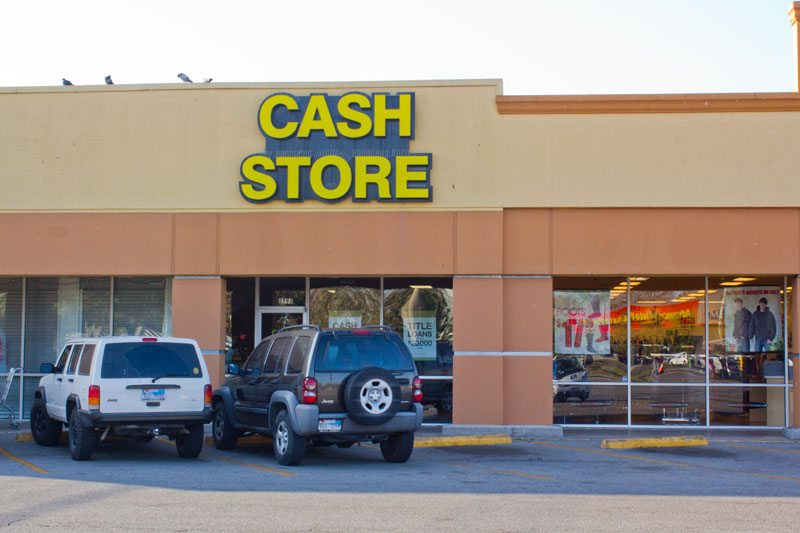
Payday Loan Industry Divides and Conquers at Capitol
Consumer advocates and Democrats are divided over a Senate bill that would impose light regulations on payday and auto-title lenders.

Above: A Cash Store location in East Austin
Last year, payday and auto-title lenders stuck Texans with more than $1.25 billion in fees on loans carrying interest rates that frequently top 500 percent. Churches, charities, consumer advocates and borrowers have increasingly expressed alarm about the destructive power of virtually unregulated short-term loans. Advocates came to the Legislature this session hoping to crack down on what they characterize as an out-of-control industry. Now, the fair lending coalition is split. Advocates are bitterly divided over legislation in the Texas Senate.
“It’s really sad,” said Ann Baddour of Texas Appleseed. “Our hand is so weak. Together we’re so much stronger than apart.”
Senate Bill 1247, carried by Dallas Republican John Carona, wouldn’t cap sky-high interest rates, but it would impose limits on the number and size of loans for some consumers. The bill would also pre-empt tougher rules passed by most of Texas’ big cities. Even Carona has described his legislation as compromised by the industry.
“You have to get the most you can get with the political support that you have,” Carona said in March. “This industry is in business and this industry has amassed enormous political support at the Capitol.”
Some progressive groups, including the Center for Public Policy Priorities and Texas Impact, have thrown their support behind the bill, arguing that it’s better than the status quo.
“For us, doing nothing is not an option this time around,” said Don Baylor, senior policy analyst at the Center for Public Policy Priorities. He points to estimates that limiting the number of times borrowers can “roll over” loans would save consumers at least $132 million.
“You get to a point where you ask yourself the question, Is there any more money [for consumers] left on the table? The folks that have decided to support it have decided there isn’t any more money on the table.”
Bee Moorhead, director of interfaith group Texas Impact, said that it’s important that legislators show the increasingly aggressive and powerful industry who’s boss.
“The thing that’s hard is that first step,” Moorhead said, “saying the state gets to decide under what terms you do business.”
Opposing the bill, however, are most Senate Democrats, the Texas Catholic Conference, Baptist organizations, Texas Appleseed and AARP.
They say that Carona’s approach falls short of meaningful reform and sanctions harmful new loan products.
“Our opposition is that this bill doesn’t do what it purports to do,” said Ann Baddour, with Austin-based group Texas Appleseed.
In Texas, payday and auto-title lenders exploit a loophole that allows them to escape Texas anti-usury laws and charge unlimited fees to their low-income customers. Under Carona’s proposal, that loophole would be preserved. To tackle the “cycle of debt” problem, whereby borrowers get stuck with loans they can’t pay, SB 1247 would impose a complicated set of income-based restrictions on how much people can borrow. For the typical two-week payday loan, borrowers would be limited to four “roll overs” and then the lender would have to put them on an extended payment plan.
Baddour says the income limits are virtually meaningless and weaker than the city ordinances imposed by Austin, Dallas, San Antonio and El Paso. Texas Appleseed calculates that a borrower could end up owing auto-title and payday lenders more money than they make in a month. SB 1247 would also officially sanction a year-long, 24-payment payday loan product.
A $1,000 loan at 500-percent APR would mean a borrower would have to pay more than $5,000 over the course of the loan.
That, she said “totally undermines [the legislation] and it’s only the most obvious loophole. We know from experience that when these businesses have an opportunity, they take it.”
The divisiveness goes beyond the fair lending groups.
After Sen. Kirk Watson, an Austin Democrat, voted for Carona’s bill in committee earlier this month, his office organized a briefing in the Civil Rights Room in the Capitol for Senate Democratic staffers. That caused a bit of a fuss because only the advocacy groups in favor of the bill were invited to the briefing. Texas Appleseed and other groups then held a second ‘anti’ briefing against the bill in Sen. Eddie Lucio’s office.
Steve Mostyn, the wealthy Houston attorney who bankrolls many Democratic campaigns, got into what several sources described as a “shouting match” in an Senate office with Scott McCown, the executive director of the Center for Public Policy Priorities. The two disagreed about whether Senate Democrats should support the bill. So far, Carona hasn’t corralled enough votes to bring the bill to the Senate floor. Mostyn’s view is that Democrats ought to stick together as a caucus and block the bill. Watson, he’s quick to point out, has received more money from payday lenders than any other Senate Democrat. (More than $42,000 since 2009, according to Texans for Public Justice.)
What seems clear is that the payday/title industry has foreclosed the options. It’s widely thought that the only reason the industry came to the table is to scuttle the city ordinances. Now, everyone else can fight over “good enough.”
“I do think that it is better than what we have, better than the status quo,” Sen. Watson said. “I’m not sure at this point that you’re going to get anything better.”
And it could be worse.
Proponents of Carona’s bill warn that if the compromise Senate bill doesn’t pass, the lenders have a back-up plan that would simply strike down existing city ordinances with no concessions from the industry—no additional regulation, just preemption of city ordinances. A bill to that effect, authored by Rep. Harold Dutton (D-Houston), will be heard in House Urban Affairs Committee tomorrow.

